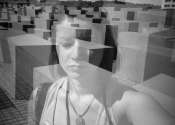Scientists eliminate key Alzheimer's feature in animal model
A study by UT Southwestern researchers finds that changing the biochemistry of parts of brain cells abolished the formation of amyloid beta plaques in a mouse model of Alzheimer's disease. The finding, published in eLife, ...
Oct 29, 2021
0
73






